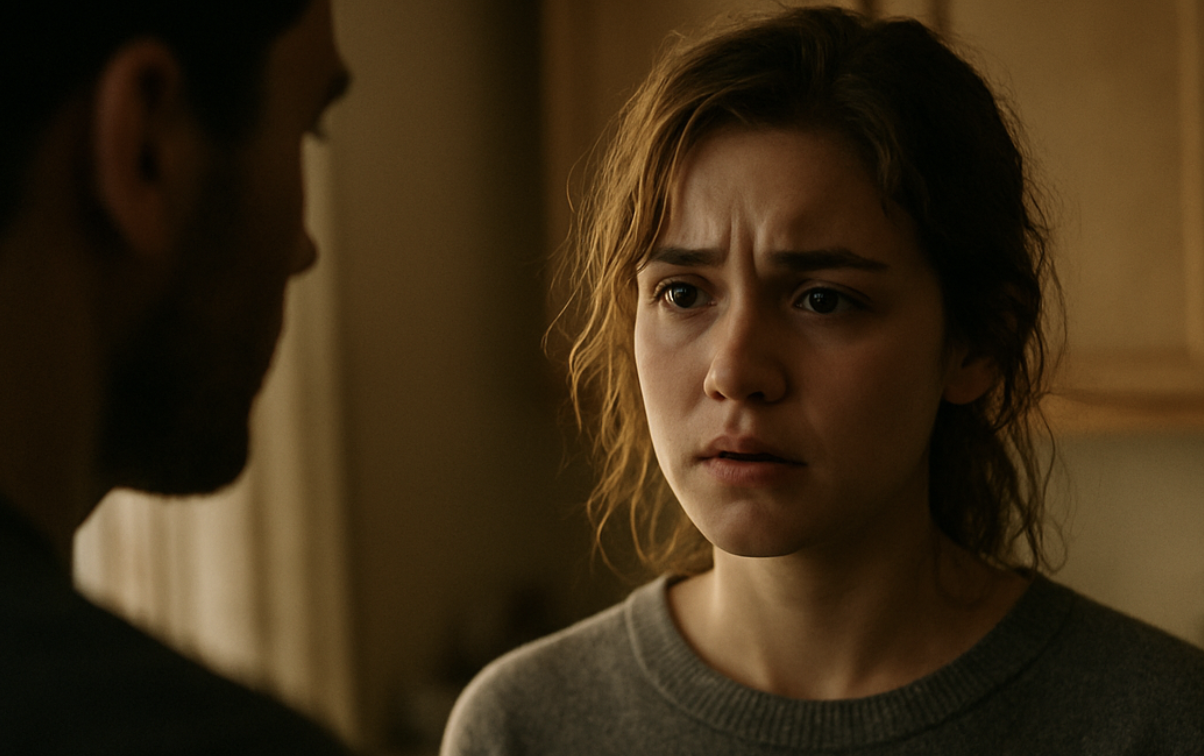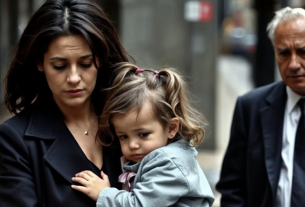— Sveta, did you put onion in the cutlets again? I told you, it gives me heartburn.
Angela’s voice, lazy and drawling, seeped into the kitchen from the couch in the living room, which had become her personal lair over the past three months. Without turning around, Svetlana brought the heavy knife down on the cutting board with a dull thud. She felt the familiar chill of irritation run down her back. Ninety-two days. For ninety-two days she had been listening to these remarks. For ninety-two days her home smelled of someone else’s perfume, and in the evenings, tear-jerker melodramas played on the TV instead of family movies. “A couple of weeks, be patient, she needs to recover after the divorce,” Artyom had said as he dragged her suitcases into their apartment. A couple of weeks had stretched into a suffocating, endless summer.
Svetlana glanced over the living room, which had become a throne room for her sister-in-law. Angela, draped in an expensive silk robe that Artyom had bought her “to cheer her up,” reclined on the pillows. A phone in one hand, a tablet on her belly. Her tablet—the one she’d given her husband for his birthday. Now it had become Angela’s personal property, just like the best chair at the dining table and the right to choose the TV channel first. The atmosphere in the apartment had grown thick and viscous, like syrup that’s starting to set. Every step Svetlana took, every dinner she cooked, every attempt to talk to the children without whispering—everything was subjected to silent, and sometimes verbal, censure. The soup is too salty. There’s dust on the top shelf. The kids run around like savages.
Her eldest, seven-year-old Kirill, tiptoed into the kitchen. His eyes turned to his mother with hope.
“Mom, can I have the tablet? Aunt Angela’s on her phone anyway.”
Svetlana closed her eyes for a second. She knew how this would end. But refusing her son in his own home was beyond her.
“Kiryusha, go ask your aunt yourself. Just be polite.”
Encouraged by permission, the boy headed for the couch. His small voice sounded timid but clear.
“Aunt Angela, may I please play on the tablet? You’re not using it right now.”
Angela reluctantly tore her gaze from her phone. She looked down at her nephew as if he were an annoying fly disturbing her royal peace.
“Kirill, I already told you. That’s a grown-up thing. You’ll either drop it or smear it up with your greasy fingers after those cutlets. No.”
It wasn’t the tone. It was the words. That contemptuous “no” that set her son a step lower, made him feel alien and unwanted in this space. Kirill, unaccustomed to such open hostility, was at a loss.
“But you’re not playing…” he whispered, instinctively reaching out toward the device lying beside her.
Angela’s reaction was sharp and disproportionate. She jerked upright, her face twisting with indignation. She snatched the tablet practically from under his hand with such force that the boy recoiled.
“I said what I said! Don’t touch my things! You’re completely out of control—no one’s even looking after you!”
The last phrase knocked the wind out of Svetlana. It was a direct, brazen jab at her. She saw her son’s lips tremble, saw a bitter, grown-up hurt gleam in his eyes. He didn’t cry. He simply turned silently and looked at his mother. And in that look was everything: bewilderment, pain, and a question she no longer had an answer for. At that very moment, something inside Svetlana finally froze solid. All the petty slights, all the months of pent-up fatigue and anger fused into one large, cold, sharp crystal.
She silently wiped her hands on her apron. She went to her son, set her hands on his shoulders, and, without so much as a glance toward Angela, led him back to the kitchen. She wasn’t going to shout. She wasn’t going to prove anything. She would just wait for her husband. She looked at the clock on the wall. Seven in the evening. Soon. And tonight’s conversation would be the last. She knew it with an absolute, frightening clarity.
Artyom came home from work tired, smelling of office coffee and exhaust fumes. He kissed Svetlana on the cheek, habitually failing to notice the tension in her face, and went into the living room.
“Hey, sis! How’s your day?” His cheery voice grated on Svetlana’s taut nerves.
“Fine. Tired of lying down,” came from the couch.
He laughed, missing the passive aggression in her words. To him, it was just a joke. He didn’t see that the apartment had ceased to be a home and had turned into a one-woman theater, where everyone except Angela served as the backstage crew. Dinner passed in oppressive silence, broken only by Angela’s comments that the pasta was a little overcooked and by Artyom’s brisk stories about work. Svetlana ate mechanically, tasting nothing. She fed their younger daughter, cleared the table, answered her husband’s questions in monosyllables. She looked like a mechanism wound up to perform certain functions. Inside her, the cold, calm ice was growing and hardening.
When the children were washed and put to bed, and the sounds of yet another TV series drifted in from the living room, Svetlana entered the kitchen, where Artyom was drinking tea. She didn’t sit down. She stood opposite him, leaning her hip against the counter. He looked up at her, and only now, in the quiet, noticed that something was wrong.
“What’s the matter? You’ve been off all evening.”
She didn’t look at him, but rather through him. Her voice was even, stripped of any emotion.
“Artyom, we need to talk. About your sister.”
He sighed heavily and set down his cup. That sigh meant: “Here we go again.”
“She yelled at Kirill today,” she cut him off, not allowing the talk to slide into the usual rut of pleas and excuses. “He wanted to take the tablet. The one I gave you, which you gave to her. She snatched it out of his hands and said he was ill-mannered and that no one takes care of him.”
Artyom frowned. He didn’t like it when the kids came up in their discussions. It complicated his stance.
“Well… she probably didn’t mean it. She’s tired, her nerves… You know, after a divorce…”
“I only know that a stranger in my home is humiliating my son,” Svetlana said crisply. Each word was hard and sharp. “And I’m not going to tolerate it any longer.”
Now Artyom understood this wasn’t just another complaint. He sat up straighter; there was a hard edge in his voice.
“What do you mean ‘a stranger’? She’s my sister! My own flesh and blood! Where is she supposed to go, out on the street? Is that what you want?”
Svetlana slowly turned her gaze on him. And he saw in her eyes something he had never seen before: absolute, boundless indifference to his arguments. She wasn’t going to argue. She had come to deliver her decision.
“Your sister has been living with us for a third month, not working, and telling me what to do? Here’s how it’s going to be: either she’s gone from here tomorrow, or I move out with the kids, and you stay with your sister.”
He froze, staring at her in disbelief. He had expected shouting, a quarrel—anything but this calm, businesslike tone with which one announces a meeting has been rescheduled.
“Are you… are you serious right now? You’re giving me an ultimatum? Over some nonsense?”
“This isn’t nonsense. This is my life and my children’s lives. And it’s you who keeps giving yourself an ultimatum, Artyom. Every day you choose not us.”
He sprang to his feet, his chair bumping the table.
“You can’t just up and throw her out! That’s inhuman!”
“I’m not throwing anyone out,” her voice remained just as even. “I’m simply taking the children and leaving myself. And you stay. With your sister. You’re so comfortable with her. You have until tomorrow morning to decide which family matters more to you.”
With that, she turned and left the kitchen, leaving him standing alone in the middle of the room. He watched her go, and it slowly, painfully dawned on him that this wasn’t a threat. It was a sentence, and she had just carried it out. He had only one night left to try to overturn it.
“I’ll talk to her. Today. Right now.”
Artyom stood in the kitchen doorway, watching as Svetlana methodically prepared breakfast. He hadn’t slept all night, tossing and turning and replaying her words in his head. They didn’t sound like a threat, but like a fait accompli. Now he was trying to find a loophole, to delay the inevitable. His voice was conciliatory; he tried to bring everything back to the familiar script in which he was the peacemaker and she was just a slightly tired wife. But Svetlana didn’t look at him. Her movements were precise and deliberate: she cracked eggs onto a hot skillet, sliced bread, took milk from the fridge for the children. She moved in her own world, a world in which there was no longer a place for him.
“I’ll explain to her that this can’t go on. We’ll set rules. She’ll help around the house, stop making remarks to you. I’ll fix everything, Sveta, I swear.”
He stepped closer, wanting to touch her shoulder, but something in the rigid, straight line of her back stopped him. She didn’t answer. The hiss of oil in the pan was louder than his words. She slid the eggs onto two children’s plates, poured the boys a glass of milk each, and set everything on a tray. She acted as if he simply wasn’t in the room. That silence was scarier than any shouting.
“Svetlana, do you hear me? I’m trying to find a solution!” Desperation crept into his voice.
She set the tray on the table and only then turned to him. There was no anger in her eyes. Only deadly weariness and a cold assessment.
“You have time, Artyom, while the children eat.”
At that moment a sleepy Angela appeared in the kitchen doorway, drawn by the voices. She yawned, wrapping herself tighter in her silk robe.
“What’s with the early-morning meeting?”
Artyom flinched like a schoolboy caught in the act. Instinctively, he shifted to place himself between his sister and his wife.
“Nothing, Anzhel. Just talking.”
But Angela wasn’t a fool. She sensed the tension hanging in the air. Her gaze slid from her brother’s bewildered face to Svetlana’s icy one.
“Talking? About me, I suppose? What, did I do something wrong again? Breathing wrong, walking wrong?”
“Angela, don’t start,” Artyom said wearily.
“What do you mean ‘don’t start’?” Her voice instantly gathered force. “I heard everything! She’s going to set rules for me! I’m in my own brother’s house, and you’re going to tell me how to live? I’m not your maid, Sveta, to scrub floors at your command!”
Svetlana was silent. She took her cup of coffee and sipped it, watching the scene as if it were a poorly staged play. Her calm infuriated Angela even more.
“You think I don’t see the way you look at me? Like I’ve ruined your whole life! You should be grateful I’m here! At least some variety in your boring life! Artyom, tell her! Tell her she has no right to talk to me like that!”
Artyom darted between them. He turned to his sister:
“Anzhel, come on, stop it, no one’s kicking you out…”
Then to his wife:
“Svet, you see, she’s on edge. Let’s not make it worse…”
He was trying to put out a fire by splashing gasoline both ways. And at that moment Svetlana saw everything with absolute clarity. He wouldn’t choose. Never. He would forever stand between them, trying to preserve this ugly, rotting world in which everyone suffered. He would keep asking her to be patient and his sister to keep it down. He would betray his family every day, bit by bit, out of fear of offending his sister.
She finished her coffee and set the empty cup in the sink. Her movements were deliberately calm. She looked straight at her husband, over Angela’s shouting.
“I understand everything now, Artyom. Thank you.”
She turned and left the kitchen, heading to the children’s room, where the boys were finishing breakfast. Her ultimatum was no longer needed. He had already given his answer. And that answer was worse than a direct “no.” It was a refusal to choose. And for her, that meant only one thing—he hadn’t chosen them.
After the morning scene in the kitchen, a viscous, unnatural silence settled over the apartment. Artyom and Angela holed up in the living room, whispering to each other as if Svetlana were a time bomb they were afraid to jostle. They had clearly decided the storm had passed. That she would yell, take offense, and, as always, give in. They didn’t understand that there was no storm inside Svetlana anymore. There was polar cold and absolute clarity. She calmly dressed the children, played with them in their room, ignoring the two questioning glances that periodically peeked through the doorway. She didn’t pack any suitcases. She didn’t fuss. She waited.
At exactly eleven o’clock the doorbell rang. Short, insistent. Artyom went to open it, obviously glad of the excuse to break the oppressive atmosphere. Two broad-shouldered men in blue uniforms stood on the threshold.
“Good afternoon. We’re from the moving service. Apartment forty-seven? We have an order to transport belongings.”
Artyom looked at them in puzzlement, then turned back into the apartment.
“You must be mistaken. We didn’t call anyone.”
“No mistake,” came Svetlana’s calm voice. She came out of the children’s room and stood behind her husband.
“Come in, gentlemen. The things are in the living room and the back room.”
The movers, ignoring the family drama, stepped briskly inside. Artyom stared at his wife as if seeing her for the first time in his life.
“Svet, what does this mean? What’s going on?”
Angela, drawn by the noise, emerged from the living room. Seeing the men, she shot them a displeased look.
“And who are these supposed to be?”
Svetlana took them both in with a cold, steady gaze. Her voice was even and businesslike, like a manager giving instructions.
“They’re movers. They’re here for Angela’s things.”
The silence in the entryway became deafening. Angela recovered first. Her face twisted with rage.
“Are you completely insane? Decided to throw me out? Artyom, do you hear what this… this… is doing?”
Artyom grabbed Svetlana’s hand. His fingers were icy.
“Svet, stop this circus! Now! Tell them to leave!”
She calmly pulled her hand free.
“I’m not telling them anything. I’ve already paid for everything. They have exactly one hour to do the job.”
One of the movers stepped into the living room and assessed the scope of work with a professional eye: two large suitcases, several boxes of shoes, bags of clothes piled in the corner.
“Start here?” he asked, looking at Svetlana.
“Yes. Go ahead,” she nodded.
“I’m not going anywhere!” Angela shrieked, lunging at her suitcases and trying to shield them with her body. “Artyom, do something! She’s throwing your sister out!”
Artyom rushed at the movers.
“Guys, wait! This is a misunderstanding! We’ll sort it out ourselves!”
But Svetlana stepped forward, her voice cracking like a whip.
“You have a paid order. Do your job. Or I’ll call your management and report a refusal to provide services.”
The movers exchanged glances. For them, the choice was obvious: on one side, a screaming woman and a bewildered man; on the other, a calm client with a receipt. They gently but firmly moved Angela aside and lifted the first suitcase.
“Where are we taking it, ma’am? Is the address on the order?” the senior asked. And there Svetlana delivered the final, most precise blow. She looked straight into her husband’s eyes, but spoke to the mover.
“Yes. To your mother’s address, Artyom. I figured Angela would be most comfortable there. I even called my mother-in-law this morning and told her the things were on their way. She’s very much looking forward to it.”
It was worse than throwing her out on the street. It was a thought-out, cold, and humiliating expulsion. Artyom froze, his face going pale. He understood he had lost. He’d lost the moment he tried that morning to sit on two chairs at once. Angela screamed something incoherent and nasty, but no one was listening anymore. One by one, the things left the apartment. The silk robe, carelessly tossed over the chair, was neatly folded and placed in a box. The tablet that started it all, Svetlana took from the table and silently handed to her son.
Forty minutes later, it was over. The apartment became empty and echoing. The movers left. Angela, spitting curses, ran out after them to supervise the loading of her life into the van. Artyom remained standing in the middle of the living room, staring at the empty spot by the couch. He turned to Svetlana. His eyes held a mixture of anger, fear, and incomprehension.
“And now what?” he managed.
Svetlana looked at him the way one looks at a complete stranger.
“And now, Artyom, I’ll decide what to do with you. And I have the rest of my life to do it.” She turned and went to the kitchen, leaving him alone in the deafening silence of their ruined family. The air in the apartment felt cleaner. And it became much easier to breathe…



